|
Books Should Be Free Loyal Books Free Public Domain Audiobooks & eBook Downloads |
|
|
Books Should Be Free Loyal Books Free Public Domain Audiobooks & eBook Downloads |
|
History Books |
|---|
|
Book type:
Sort by:
View by:
|
By: Bennet Burleigh (-1914) | |
|---|---|
 Khartoum Campaign, 1898 or the Re-Conquest of the Soudan
Khartoum Campaign, 1898 or the Re-Conquest of the Soudan
| |
By: Benson John Lossing (1813-1891) | |
|---|---|
 Washington and the American Republic, Vol. 3.
Washington and the American Republic, Vol. 3.
| |
By: Benvenuto Cellini ((1500-1571)) | |
|---|---|
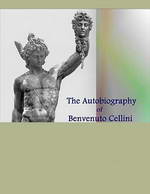 The Autobiography of Benvenuto Cellini
The Autobiography of Benvenuto Cellini
Cellini’s autobiographical memoirs, which he began writing in Florence in 1558, give a detailed account of his singular career, as well as his loves, hatreds, passions, and delights, written in an energetic, direct, and racy style. They show a great self-regard and self-assertion, sometimes running into extravagances which are impossible to credit. He even writes in a complacent way of how he contemplated his murders before carrying them out. He writes of his time in Paris: Parts of his tale recount... | |
By: Bernard Henry Becker (1833-) | |
|---|---|
 Disturbed Ireland Being the Letters Written During the Winter of 1880-81.
Disturbed Ireland Being the Letters Written During the Winter of 1880-81.
| |
By: Bernard Le Bovier de Fontenelle (1657-1757) | |
|---|---|
 Conversations on the Plurality of Worlds
Conversations on the Plurality of Worlds
This book is a popular science book written in the late 1600s. It is written as a series of conversations between a gallant philosopher and a countess, while walking in her garden and gazing at the stars. The philosopher explains the heliocentric model of the solar system and also muses on the possibility of extraterrestrial life. While it explains the heliocentric model, unlike other astronomy works of the time, it did not attract the attention of the Church. | |
By: Bertha F. Herrick | |
|---|---|
 Myths and Legends of Christmastide
Myths and Legends of Christmastide
| |
By: Bertram Lenox Simpson (1877-1930) | |
|---|---|
 The Fight for the Republic in China
The Fight for the Republic in China
| |
By: Bertram Mitford (1855-1914) | |
|---|---|
 The Sign of the Spider
The Sign of the Spider
| |
By: Bertrand Russell | |
|---|---|
 Proposed Roads to Freedom
Proposed Roads to Freedom
Bertrand Russell, 3rd Earl Russell (1872 – 1970) was a British philosopher, logician, mathematician, political activist and Nobel laureate. He led the British “revolt against idealism” in the early 1900s and is considered one of the founders of analytic philosophy along with his predecessor Gottlob Frege and his protégé Ludwig Wittgenstein. In this book, written in 1918, he offers his assessment of three competing streams in the thought of the political left: Marxian socialism, anarchism and syndicalism. | |
 The Practice and Theory of Bolshevism
The Practice and Theory of Bolshevism
| |
 Philosophical Essays
Philosophical Essays
Six out of seven essays appearing here were reprinted from other publications; indeed, this 1910 collection went out of print, so that two of the essays occurring here were reprinted in Russell's 1917 "Mysticism and Logic, and Other Essays". Nonetheless, this essay records Russell's thinking at a critical juncture, just before the publication of Volume I of the co-authored "Principia Mathematica" and just after the passing of the American pragmatist, William James. These essays record Russell's reactions... | |
 Practice and Theory of Bolshevism
Practice and Theory of Bolshevism
This book records Bertrand Russell's impressions of the new regime after a 1920 visit to Russia following the 1917 Bolshevik Revolution, including his meetings with Lenin, Trostky, and Gorky. It includes a chapter that was authored by Dora Black, educational theorist and feminist author, and Russell's spouse. This chapter was unfortunately removed in the second edition, which was issued after Dora and Bertrand divorced. This recording is dedicated to my darling wife, Jill. Happy Hanukkah and Happy 2020! - Summary by Landon D. C. Elkind | |
 Problems of Philosophy (version 2)
Problems of Philosophy (version 2)
This 1912 book remains among the most widely-used and well-written introductions to philosophy in English. It was aimed to be an accessible introduction to philosophy for the average shopkeeper in England in 1912. Despite its accessibility It has engaged scholarly philosophical commentators on a range of issues raised in the work. Above all it conveys in easy and witty manner the philosophical frame of mind to those that have never encountered it before. It was almost immediately, and remains today, a classic. This recording is dedicated to Jill Evans, Esq. | |
 On Propositions: What They Are and How They Mean
On Propositions: What They Are and How They Mean
In this piece, Bertrand Russell offers an account of propositions. This essay has been widely regarded as a turning point in Russell's thought: fresh from his prison sentence, during which he read numerous works of psychology, he now rejects the existence of the unitary, lasting metaphysical subject and the act-object analysis of sensation. He here embraces the view advocated by American philosophers like William James, namely, neutral monism. This far-ranging essay includes a lengthy discussion of behaviorism and of the structure of facts, complete with an endorsement of negative facts and criticisms of attempts to avoid them. - Summary by Landon D. C. Elkind | |
 Mysticism and Logic and Other Essays
Mysticism and Logic and Other Essays
This anthology collects a number of fascinating strands of Bertrand Russell's thought. "Mathematics and the Metaphysicians" details the impact of the 1900 World Congress of Philosophers on Russell's development and the hope that new methods in mathematics could be applied to the solution of ancient philosophical problems. Many of the subsequent essays show the evolution of this hope as Russell worked on the foundations of mathematics and applied the new methods to the reconstruction of physical objects on the basis of sense-data, and the redefinition of matter and cause. | |
By: Bill Nye | |
|---|---|
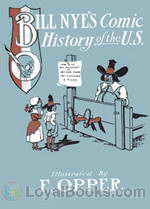 Comic History of the United States
Comic History of the United States
For American journalist and humorist Edgar Wilson Nye who wrote under the pen name Bill Nye in the late 19th century, facts are not to be presented in their newborn, bare state. They should be properly draped and embellished before they can be presented before the public. Hence, in the Comic History of the United States published in 1894, he gives his readers the facts. But in a bid to make the historical figures more human he describes them as “people who ate and possibly drank, people who were born, flourished and died, not grave tragedians posing perpetually for their photographs... | |
 Comic History of England
Comic History of England
If you thought history was dull, dry and boring, you haven't read Bill Nye's books! He brings wit, humor, satire, irony and sheer nonsensical fun into the subject, making it both entertaining and memorable. The Comic History of England was published posthumously in 1896 after the writer's tragic and untimely death half-way through the project. Hence it remains incomplete and covers the history of the island nation only up to the Tudor period. However, beginning with Julius Caesar, the Roman invasion of Britain, the Druids and Stonehenge, this book is still a rib-tickling ride through the centuries... | |
By: Bliss Perry (1860-1954) | |
|---|---|
 The American Spirit in Literature : a chronicle of great interpreters
The American Spirit in Literature : a chronicle of great interpreters
| |
 The American Mind The E. T. Earl Lectures
The American Mind The E. T. Earl Lectures
| |
By: Blythe Harding | |
|---|---|
 The Honest American Voter's Little Catechism for 1880
The Honest American Voter's Little Catechism for 1880
| |
By: Bolesław Prus (1847-1912) | |
|---|---|
 The Pharaoh and the Priest An Historical Novel of Ancient Egypt
The Pharaoh and the Priest An Historical Novel of Ancient Egypt
| |
By: Booker T. Washington (1856-1915) | |
|---|---|
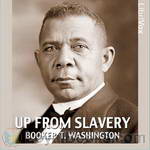 Up From Slavery
Up From Slavery
Up From Slavery is the 1901 autobiography of Booker T. Washington detailing his slow and steady rise from a slave child during the Civil War, to the difficulties and obstacles he overcame to get an education at the new Hampton University, to his work establishing vocational schools—most notably the Tuskegee Institute in Alabama—to help black people and other disadvantaged minorities learn useful, marketable skills and work to pull themselves, as a race, up by the bootstraps. He reflects on the generosity of both teachers and philanthropists who helped in educating blacks and native Americans... | |
 Character Building
Character Building
Character Building is a compilation of speeches, given by Mr. Booker T. Washington, to the students and staff of the Tuskegee Normal and Industrial Institute (now known as Tuskegee University).Booker T. Washington was one of the most prominent leaders in advancing African-American civil rights. Born into slavery and freed as a young boy, he rose through the ranks of education to eventually earn his position as principal of Tuskegee. Under his guidance, the school was built, by students and for students, to give them a deeply meaningful education... | |
By: Boyd Cable (1878-1943) | |
|---|---|
 Between the Lines
Between the Lines
This book, all of which has been written at the Front within sound of the German guns and for the most part within shell and rifle range, is an attempt to tell something of the manner of struggle that has gone on for months between the lines along the Western Front, and more especially of what lies behind and goes to the making of those curt and vague terms in the war communiqués. I think that our people at Home will be glad to know more, and ought to know more, of what these bald phrases may actually signify, when, in the other sense, we read 'between the lines.' | |
By: Brander Matthews (1852-1929) | |
|---|---|
 Inquiries and Opinions
Inquiries and Opinions
| |
By: Bret Harte (1836-1902) | |
|---|---|
 Thankful Blossom
Thankful Blossom
| |
By: Brinsley MacNamara (1890-1963) | |
|---|---|
 Valley of the Squinting Windows
Valley of the Squinting Windows
The Valley of the Squinting Shadows was the author's first novel and proved controversial. In it, he tells a realistic tale of life in a small Irish town as he saw it, rather than the romanticized version told by others, or how the locals wished to be seen. Mrs. Brennan, the local dressmaker, has opinions. Her son is off studying to become a priest, which elevates him -- and thus her -- in her opinion. Mr. Brennan is forgiven all his transgressions, on account of being father to the son. Mrs. Brennan is less tolerant of those not related to her and her acerbic tongue is well-known throughout the village... | |
By: Brooks Adams (1848-1927) | |
|---|---|
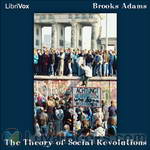 The Theory of Social Revolutions
The Theory of Social Revolutions
Brooks Adams (1848- 1927), was an American historian and a critic of capitalism. He believed that commercial civilizations rise and fall in predictable cycles. First, masses of people draw together in large population centers and engage in commercial activities. As their desire for wealth grows, they discard spiritual and creative values. Their greed leads to distrust and dishonesty, and eventually the society crumbles. In The Law of Civilisation and Decay (1895), Adams noted that as new population centers emerged in the west, centers of world trade shifted from Constantinople to Venice to Amsterdam to London... | |
 The Emancipation of Massachusetts
The Emancipation of Massachusetts
| |
By: Bruce Bairnsfather (1888?-1959) | |
|---|---|
 Fragments From France
Fragments From France
| |
By: BS Murthy | |
|---|---|
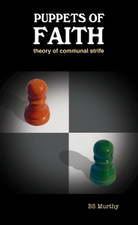 Puppets of Faith: Theory of Communal Strife
Puppets of Faith: Theory of Communal Strife
When a bunch of apparently non-practicing Musalmans headed by Mohamed Atta launched that fidayeen attack on New York’s World Trade Centre that Sep 11, the world at large, by then familiar with the ways of the Islamic terrorism, was at a loss to fathom the unthinkable source of that unexpected means of the new Islamist scourge. The symptoms of a latent terrorist in the Muslim youth can be traced to the sublimity of Muhammad's preaching’s in Mecca and the severity of his Medina sermons make Islam a Janus-faced faith that forever bedevils the mind of the Musalmans... | |
By: Budgett Meakin (1866-1906) | |
|---|---|
 Life in Morocco and Glimpses Beyond
Life in Morocco and Glimpses Beyond
| |
By: Bulstrode Whitlocke (1605-1676?) | |
|---|---|
 A Journal of the Swedish Embassy in the Years 1653 and 1654, Vol II.
A Journal of the Swedish Embassy in the Years 1653 and 1654, Vol II.
| |
By: Burton Egbert Stevenson (1872-1962) | |
|---|---|
 A Soldier of Virginia
A Soldier of Virginia
| |
By: Burton Jesse Hendrick (1870-1949) | |
|---|---|
 The Age of Big Business; a chronicle of the captains of industry
The Age of Big Business; a chronicle of the captains of industry
| |
 The Life and Letters of Walter H. Page, Volume I
The Life and Letters of Walter H. Page, Volume I
| |
By: Bury Palliser (1805-1878) | |
|---|---|
 Brittany & Its Byways
Brittany & Its Byways
| |
By: Byron A. Dunn (1842-1926) | |
|---|---|
 Raiding with Morgan
Raiding with Morgan
It is a fictional tale of cavalry actions during the U.S. Civil War, under General John Morgan. | |
By: C. A. (Caroline Augusta) Frazer | |
|---|---|
 Atmâ A Romance
Atmâ A Romance
| |
By: C. A. (Cyrus Augustus) Bartol (1813-1900) | |
|---|---|
 Senatorial Character A Sermon in West Church, Boston, Sunday, 15th of March, After the Decease of Charles Sumner.
Senatorial Character A Sermon in West Church, Boston, Sunday, 15th of March, After the Decease of Charles Sumner.
| |
By: C. A. Rose | |
|---|---|
 Three years in France with the Guns: Being Episodes in the life of a Field Battery
Three years in France with the Guns: Being Episodes in the life of a Field Battery
| |
By: C. B. Black (-1906) | |
|---|---|
 The South of France—East Half
The South of France—East Half
| |
 Itinerary through Corsica by its Rail, Carriage & Forest Roads
Itinerary through Corsica by its Rail, Carriage & Forest Roads
| |
By: C. Bryson Taylor (1880-) | |
|---|---|
 Nicanor - Teller of Tales A Story of Roman Britain
Nicanor - Teller of Tales A Story of Roman Britain
| |
By: C. C. (Christopher Columbus) Andrews (1829-1922) | |
|---|---|
 Minnesota and Dacotah
Minnesota and Dacotah
| |
By: C. C. James (1863-1916) | |
|---|---|
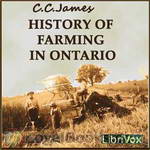 History of Farming in Ontario
History of Farming in Ontario
This paper takes the reader through the early settlement from 1783 to the modern period of 1888-1912. We see how farming and farm industries developed and how the population was distributed during these times. We see the trends of settlers moving into the Urban centers instead of rural and how the farm industries (making cheese, butter, wool, etc) move off the farm to the city factories. Excerpt: “The farmer’s wife in those days was perhaps the most expert master of trades ever known. She could spin and weave, make a carpet or a rug, dye yarns and clothes, and make a straw hat or a birch broom... | |
By: C. E. (Charles Edward) Callwell (1859-1928) | |
|---|---|
 Experiences of a Dug-out, 1914-1918
Experiences of a Dug-out, 1914-1918
| |
By: C. E. W. (Charles Edwin Woodrow) Bean (1879-1968) | |
|---|---|
 Letters from France
Letters from France
| |
By: C. F. (Charles Fayette) McGlashan | |
|---|---|
 History of the Donner Party, a Tragedy of the Sierra
History of the Donner Party, a Tragedy of the Sierra
| |
By: C. F. (Charles Finch) Dowsett (1836?-1915) | |
|---|---|
 A start in life. A journey across America. Fruit farming in California
A start in life. A journey across America. Fruit farming in California
| |
By: C. F. Argyll Saxby | |
|---|---|
 The Fiery Totem A Tale of Adventure in the Canadian North-West
The Fiery Totem A Tale of Adventure in the Canadian North-West
| |
By: C. G. (Charles Gilbert) Hine (1859-1931) | |
|---|---|
 The New York and Albany Post Road From Kings Bridge
The New York and Albany Post Road From Kings Bridge
| |
By: C. Gasquoine Hartley (1867-1928) | |
|---|---|
 The Truth About Woman
The Truth About Woman
| |
By: C. H. Thomas | |
|---|---|
 Origin of the Anglo-Boer War Revealed (2nd ed.) The Conspiracy of the 19th Century Unmasked
Origin of the Anglo-Boer War Revealed (2nd ed.) The Conspiracy of the 19th Century Unmasked
| |
By: C. H. W. (Claude Hermann Walter) Johns (1857-1920) | |
|---|---|
 Babylonian and Assyrian Laws, Contracts and Letters
Babylonian and Assyrian Laws, Contracts and Letters
| |
By: C. R. M. F. (Charles Robert Mowbray Fraser) Cruttwell (1887-1941) | |
|---|---|
 The War Service of the 1/4 Royal Berkshire Regiment (T. F.)
The War Service of the 1/4 Royal Berkshire Regiment (T. F.)
| |
By: C. R. N. (Charles Richard Newdigate) Burne | |
|---|---|
 With the Naval Brigade in Natal (1899-1900) Journal of Active Service
With the Naval Brigade in Natal (1899-1900) Journal of Active Service
| |
By: C. Reginald (Charles Reginald) Enock (1868-1970) | |
|---|---|
 Mexico Its Ancient and Modern Civilisation, History, Political Conditions, Topography, Natural Resources, Industries and General Development
Mexico Its Ancient and Modern Civilisation, History, Political Conditions, Topography, Natural Resources, Industries and General Development
| |
By: C. S. (Constantine Samuel) Rafinesque (1783-1840) | |
|---|---|
 The Ancient Monuments of North and South America, 2nd ed.
The Ancient Monuments of North and South America, 2nd ed.
| |
By: Caleb Huse (1831-1905) | |
|---|---|
 The Supplies for the Confederate Army, how they were obtained in Europe and how paid for.
The Supplies for the Confederate Army, how they were obtained in Europe and how paid for.
| |